- full price € 15 at the box office - € 14 online
- reduced price € 12 at the box office - € 11 online
– for young people aged between 18 and 25 (not yet turned 25);
– for groups of 15 people or more;
– La Galleria Nazionale, Museo Ebraico di Roma ticket holders;
– upon presentation of ID card or badge: Accademia Costume & Moda, Accademia Fotografica, Biblioteche di Roma, Centro Sperimentale di Cinematografia, Enel (for badge holder and accompanying person), FAI Fondo Ambiente Italiano, Feltrinelli, Gruppo FS, IN/ARCH Istituto Nazionale di Architettura, Sapienza Università di Roma, LAZIOcrea, Palazzo delle Esposizioni, Amici di Palazzo Strozzi, Accademia Nazionale di Santa Cecilia, Scuola Internazionale di Comics, Teatro Olimpico, Teatro dell’Opera di Roma, Teatro di Roma, Università degli Studi di Roma Tor Vergata, Youthcard; - August promo for Lazio residents € 7
valid from August 1st to August 31st, upon presentation of an identity document verifying residency in the Lazio Region
- open € 18
valid for one year from the date of purchase
- free
– minors under 18 years of age;
– myMAXXI cardholders;
– on your birthday presenting an identity document;
– upon presentation of EU Disability Card holders and or accompanying letter from hosting association/institution for: people with disabilities and accompanying person, people on the autistic spectrum and accompanying person, deaf people, people with cognitive disabilities and complex communication needs and their caregivers, people with serious illnesses and their caregivers, guests of first aid and anti-violence centres and accompanying operators, residents of therapeutic communities and accompanying operators;
– MiC employees;
– journalists who can prove their business activity;
– European Union tour guides and tour guides, licensed (ref. Circular n.20/2016 DG-Museums);
– 1 teacher for every 10 students;
– AMACI members;
– CIMAM International Committee for Museums and Collections of Modern Art members;
– ICOM members;
– from Tuesday to Friday (excluding holidays) European Union students and university researchers in art history and architecture, public fine arts academies (AFAM registered) students and Temple University Rome Campus students;
– IED Istituto Europeo di Design professors, NABA Nuova Accademia di Belle Arti professors, RUFA Rome University of Fine Arts professors;
– upon presentation of ID card or badge: Collezione Peggy Guggenheim a Venezia, Castello di Rivoli Museo d’Arte Contemporanea, Sotheby’s Preferred, MEP – Maison Européenne de la Photographie;
Collection
MAXXI’s Collection of Art and Architecture represents the founding element of the museum and defines its identity. Since October 2015, it has been on display with different arrangements of works.






































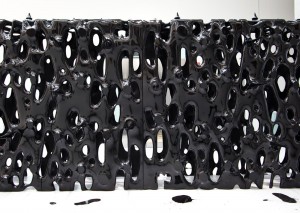
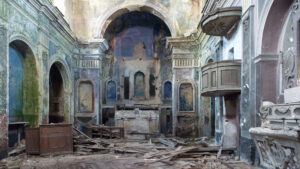

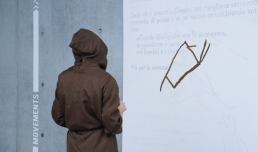
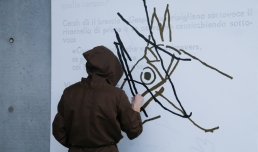

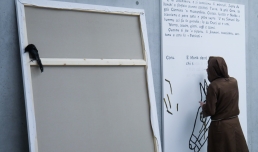

with Andrea Celeste La Forgia
There are no painters but only people who engage in painting among other activities
foyer Carlo Scarpa
The exhibition has been extended until 1 November 2020.
The Independent is a project by Hou Hanru
curated by Elena Motisi
Three canvases combine words, painting and gestures in a critical rethinking of the past as a means of building friendships, solidarity and alliances.
THE INDEPENDENT, MAXXI’s programme dedicated to independent thought and practice, presents Max Fletcher’s special project in collaboration with Andrea Celeste La Forgia: There are no painters but only people who engage in painting among other activities. The work is the result of a performance conceived for the FRIENDSHIP | SOLIDARITY | ALLIANCES summit on the occasion of the five-year anniversary of THE INDEPENDENT.
Within the framework of the Summit, British artist Max Fletcher – currently residing at the British School in Rome – has produced a series of three canvases during a complex action in which words, painting and gestures combine in a critical rethinking of the past as a means of building friendships, solidarity and alliances. Pasolini is the essential reference for both the performance and the canvases, which contain three excerpts from dialectal theatrical texts taken from Pasolini himself and two of his beloved writers, Pirandello and Bertolazzi.
The selected passages – translated into English – offer a humorous representation of moments centred on a sense of community and solidarity, notions that Pasolini attributes to the dialect, understood as Gramsci did, namely as an emancipatory form of literature capable of subverting or contrasting the concepts of linear progress and formal unification.
header: photo © Fondazione MAXXI